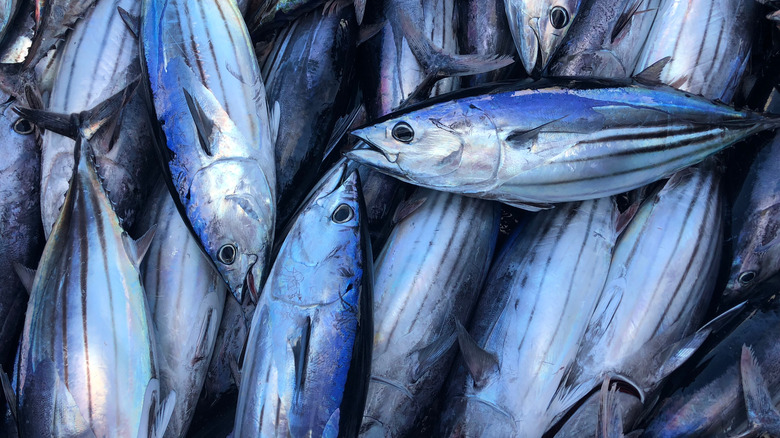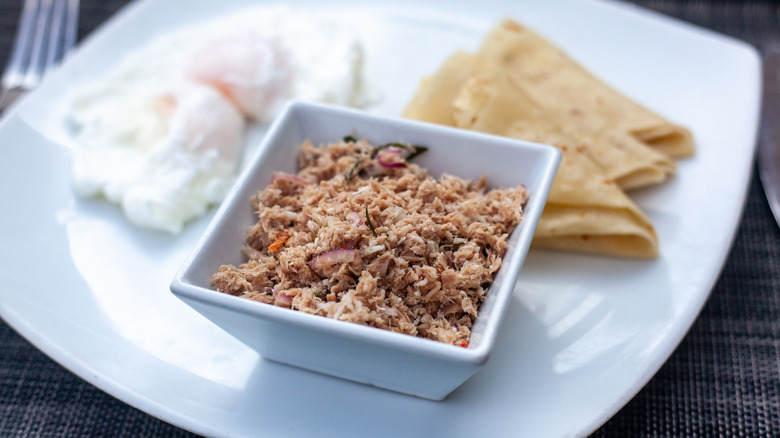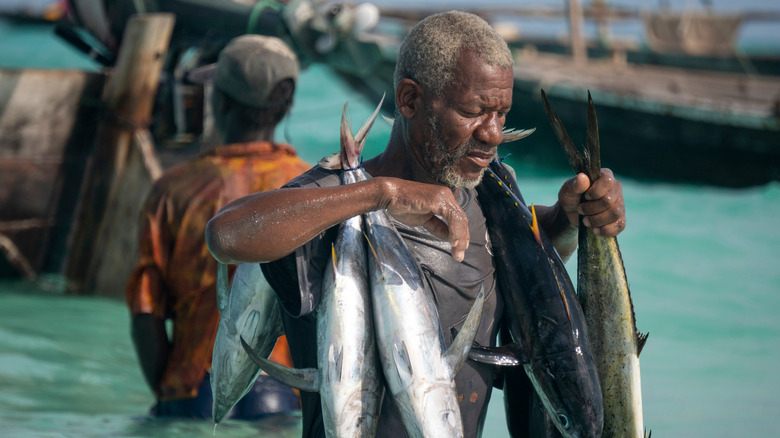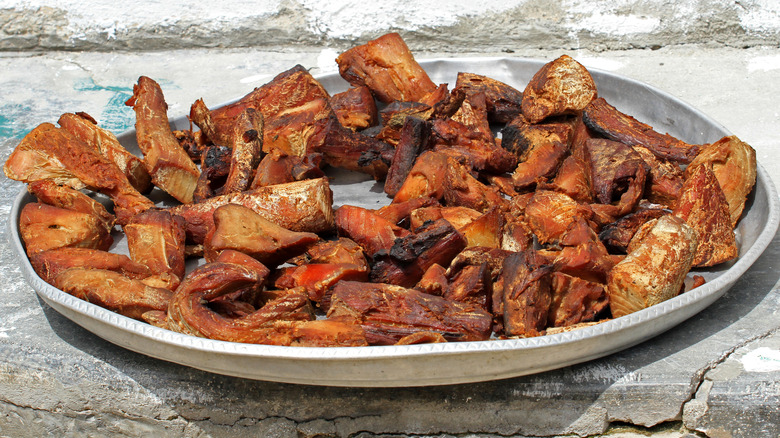Why Tuna Is So Important To The Maldives
The Maldives is an island paradise known for its sultry climate, pristine beaches, clear water, and most importantly, lots and lots of tuna fish.
The island nation boasts more than a thousand species of fish, per the Convention on Biological Diversity. This bountiful fishery doesn't merely influence their food, tuna fish recipes define their cuisine. The fishing industry doesn't just create a few jobs, it determines livelihoods. Furthermore, it plays a role in their traditions — past and present — and contributes to their economy (via Google Arts and Culture).
As you can probably guess, fishing is not your typical 9-to-5 job. According to the International Union for Conservation of Nature, Maldivian fishermen toil the blue of the Indian Ocean during the night to source bait, so that they can catch tuna during the day. Using poles, lines, bait, and hooks, they prey on the fish, snatching them deftly from the water and swinging them overhead onto the deck of the vessels.
An important food source
Maldives Economic Review describes fishing as "the life blood of the Maldives" because historically, fish was the sole source of protein for the island nation's residents. While additional dietary options are available today, over 70% of the population still relies on locally caught tuna.
The average Maldivian eats 359 pounds of tuna yearly, making the country the largest consumer of tuna per capita (via Seafood Source). Eating that much tuna may sound repetitive, but the abundant fisheries in the Maldives produce several varieties of tuna, such as skipjack, frigate, yellowfin, big eye, and little tuna (per Lonumedhu).
Given the latter, it is no surprise that tuna defines the Maldivian diet. The various subspecies of the fish are featured in numerous traditional dishes like curries, cakes, and seared steaks (via Maldivian High Commission). According to Taste Atlas, the national dish of the Maldives is gulha, which consists of a stuffed fried pastry containing onions, coconut, and of course, smoked tuna. Tuna is even featured in the standard Maldivian breakfast recipe (mas huni) along with coconut, onions, and chili peppers, but with a tortilla-like flatbread on the side.
A sustainable form of job creation
Maldivians have a unique style of catching their tuna. While a dominant percentage of the world's fishing industry relies on mechanized trawlers and nets, Maldivians simply use a pole, line, and a barbless hook, per Google Arts and Culture. This method means that they pull the fish out of the water individually.
The latter is not due to the lack of technological advancement or a refusal to get with the times, but rather a consciousness of tuna's finite nature and an attempt at sustainable fishing.
In an interview with CNN, Maldivian fisherman Hamid Abdallah says: "We catch fish by pole and line because we want to be able to keep doing it for as long as we can." Catching the tuna individually not only saves the lives of unintended marine species, but also gives the Maldivian fishermen more control over the quality of fish they pull out (via Brill).
A vital element in the Maldivian economy
According to Invest Maldives, tuna fishermen account for over 20% of the Maldivian workforce and their contribution to the country's economy is anything but small. A whopping 98% of the country's gross exports come from the fishing industry.
Not only does the state control and regulate tuna fishing methods for the island nation, but it owns interests in the industry like the Maldives Industrial Fisheries Company (MIFCO) and a fish processing factory on one of the country's islands (via Maldives Financial Review). MIFCO, which is the dominant force in the country, creates economic opportunities by buying fish from local fishermen and handling most exports.
According to World Atlas, fisheries are the second largest contributor to the Maldivian economy (behind tourism), with 90% of the gross catch being tuna. Despite recent growth in the tourism sector, tuna fishing remains a proud profession and an important part of the Maldivian economy.



